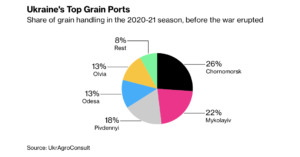President Donald Trump on Friday signed an executive order temporarily expanding the amount of beef the U.S. can import from Argentina, a move the White House says is aimed at…
Ukraine Plans to Move Ahead on Black Sea Export Deal, Despite Missile Strikes
Financial Times writers Mark Raczkiewycz and Polina Ivanova reported yesterday that, “Ukraine hopes to start implementing a deal to export millions of tonnes of grain from blockaded Black Sea ports as soon as this week, even after Russian missile strikes hit the key Ukrainian port city of Odesa and threatened to unravel the agreement.
“Preparations include demining essential areas for maritime traffic and setting up special naval corridors for the safe passage of merchant vessels, as well as the setting up of a co-ordination centre in Istanbul, where the deal, brokered by the UN and Turkey, was signed on Friday.
“The plans are moving ahead, a Ukrainian official said on Monday, despite the Odesa strikes, which Ukraine previously described as violating Russia’s promise not to attack grain infrastructure and calling the entire deal into question. Russia said it targeted military infrastructure in the port.”
The FT writers noted that, “President Recep Tayyip Erdoğan of Turkey said on Monday evening that Ankara remained committed to its end of the agreement and that work continued on operations that would be based in Istanbul.
“‘We can see how sensitive the process is with the attack on the Odesa port on Saturday,’ Erdoğan said in an interview with state broadcaster TRT. ‘We are saddened by this happening, and a failure here will be to everyone’s detriment. We are reminding them of this.
“‘We expect everyone to stand by their signatures and to act in line with the responsibilities they assumed and to avoid actions that are contrary to the agreement’s words and spirit.'”
Also yesterday, Reuters writers Pavel Polityuk and Max Hunder reported that,
Despite a weekend air strike, the first ships from Ukraine’s Black Sea ports may set sail in days under a deal agreed on Friday, the United Nations said. This would help ease an international food crisis, although mistrust and potential danger remained.
The Reuters article explained that, “A Ukrainian government official said he hoped the first grain shipment from Ukraine could be made from Chornomorsk this week, with shipments from other ports within two weeks. The United Nations expects the first ship to move within a few days.
“Detailed procedures for ships will be published in the near future, said deputy U.N. spokesperson Farhan Haq.”
And a separate Reuters article from yesterday reported that, “Russian Foreign Minister Sergei Lavrov said on Monday there are no barriers to the export of grain from Ukrainian ports, after Ukraine and Russia signed a deal to unblock grain shipments on the Black Sea in Turkey last week.”
And Bloomberg writers Elizabeth Elkin and Megan Durisin reported yesterday that, “Wheat pared gains as the United Nations said all parties have reconfirmed their commitment to begin shipping millions of tons of grain that has been piling up since Russia’s invasion of Ukraine.”

The Bloomberg article pointed out that, “Wheat futures in Chicago traded 1.5% higher at 1:16 p.m. local time after earlier surging as much as 4.6% before the UN comments.
“‘The willingness of ship owners to come with their ships to our ports will be the crucial factor to recover export volumes from Ukraine,’ Roman Slaston, director general of the Ukrainian Agribusiness Club, said by telephone. Farmers ‘have some cautious optimism about this deal, but they also understand that any time it might stop again.'”
Elsewhere, Reuters News reported today that, “Chicago corn jumped 2% on Tuesday, with prices climbing to their highest in almost one week, while soybeans rose 1.5% after a U.S. government report showed declining condition of both crops.
“Wheat gained more ground after a Russian missile strike on the Ukrainian port of Odesa over the weekend raised doubts about implementation an agreement to open a corridor for Ukrainian grain exports.”
The Reuters article added that, “The U.S. Department of Agriculture’s weekly condition ratings for corn, soybeans and spring wheat on Monday fell more than most analysts expected after sweltering heat across the U.S. Midwest and Plains.
“The agency rated 61% of the U.S. corn crop in good to excellent condition, down from 64% a week earlier, and soybean ratings fell to 59% good-to-excellent, from 61% previously.”





